Thursday 17th October – DAY TWO – Between Tyumen and Kishin – Siberia!
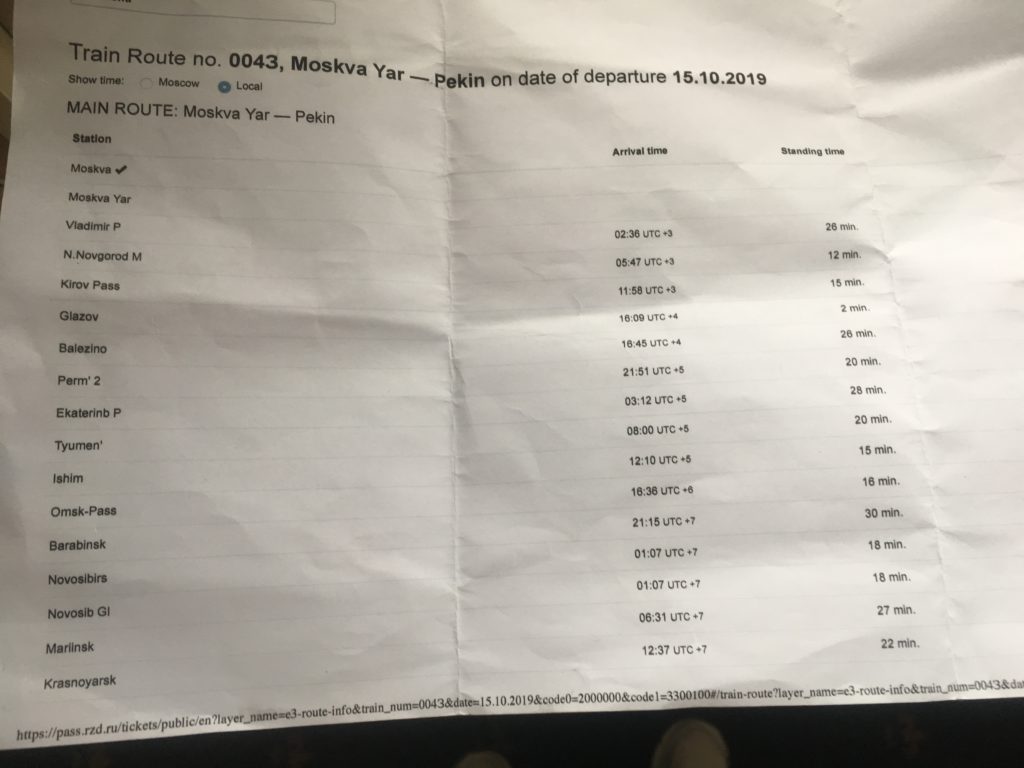
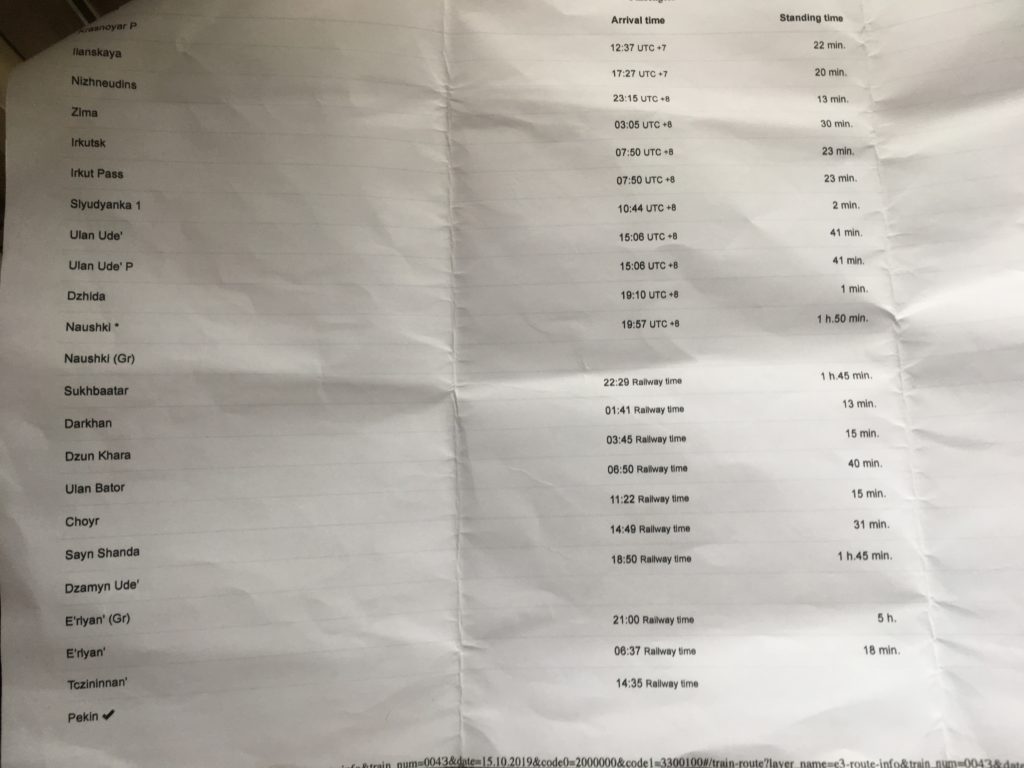
I slept extremely well. My hip sockets and I became well acquainted. Anton and I soon worked out friendly space sharing, taking turns to fish things out of luggage and arrange bedding while the other disappeared into the corridor. In Anton’s case, he chatted on the phone. In mine, hypnosis out the window.

Anton’s using one of the Chinese tea cups
I prepared a little bag with scarf, hat, gloves and raincoat for outings so I could grab and run. Anton pointed out what I had thought was an air-gap was actually a luggage store for any further passenger joining us in the top bunks. He told me not to worry and, strangely, due to his calm demeanour, I no longer worried. I could spread out my belongings. There was a metal compartment under the bunk that, when you lifted the heavy bed up, provided a certain security for valuables. Luckily, Anton always lifted the bunk for me when he was around, otherwise I found it tricky getting stuff in and out.
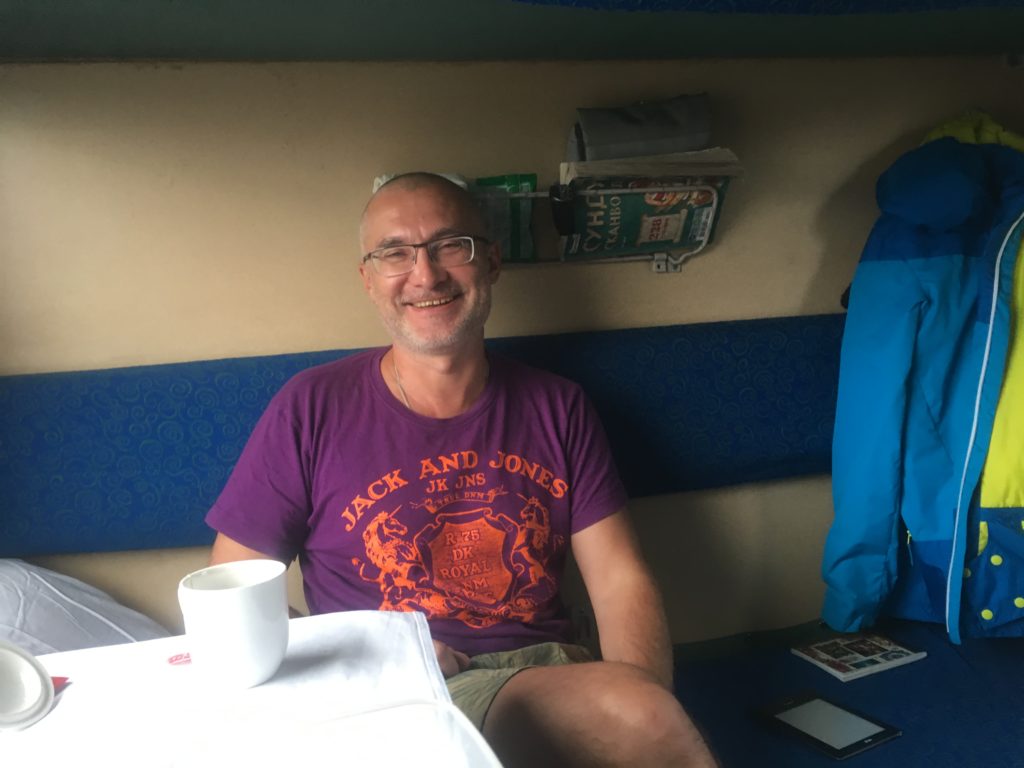
When Anton brought out his lunch we both gave thanks to his Mami. Why not? She was a lovely generous woman who cared for her son! He examined my rice cakes and miso soup, fruit and chocolate with some bemusement. ‘In Russian winter, vegan die.’
We both thought the crystalised dried beetroot chip things I’d found in Moscow were a bit too sweet. But he’d brought dried figs. And really nice tea with wild thyme.
I gathered up courage to take a morning stroll to the end of the train and found each carriages varied from 18 to 30 degrees. Apart from the three Kiwis, I enjoyed a funny chat with Maria and Sauli from Finland. They were replaying the Fino-Russian war. They preferred the cooler 18 but their Russian companions liked 26. Their captain, Chinese peacemaker, had shut their open window but allowed the Finns to keep the door open to the carriage link to get a little breeze by their compartment.
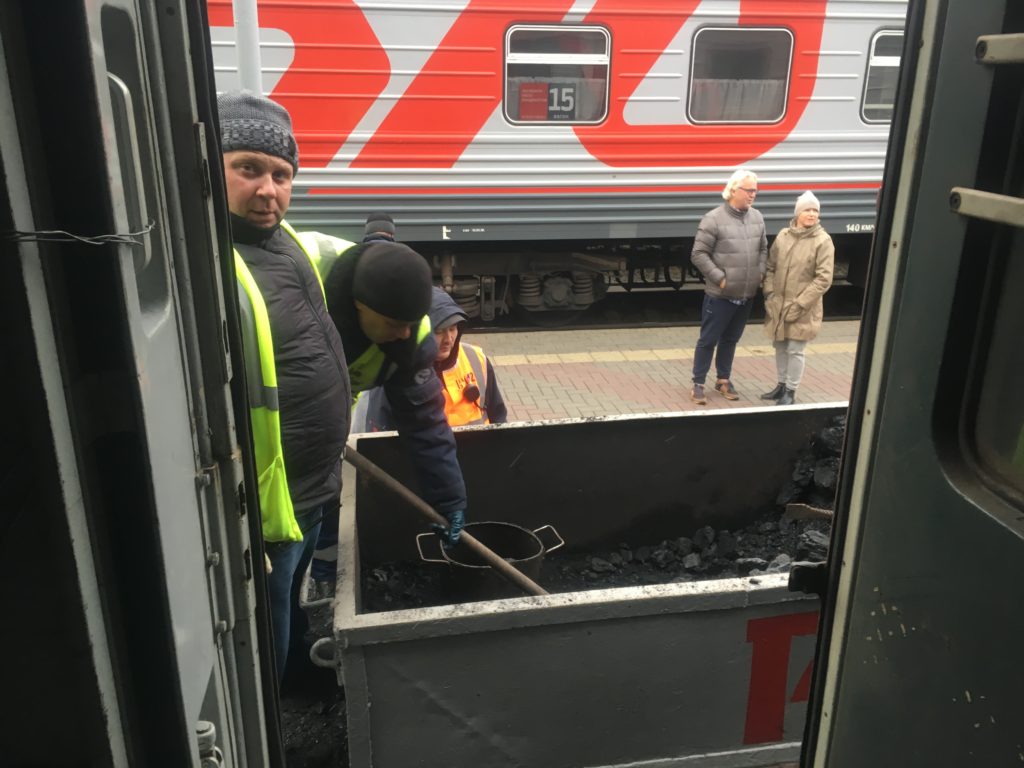
First-class had crushed red-faux velvet to distinguish themselves from us plebs who had a rather pleasant blue fabric. I thought their bunks were a bit softer but later when Maria and Sauli came by, on their way to the restaurant car, they insisted ours were exactly the same.
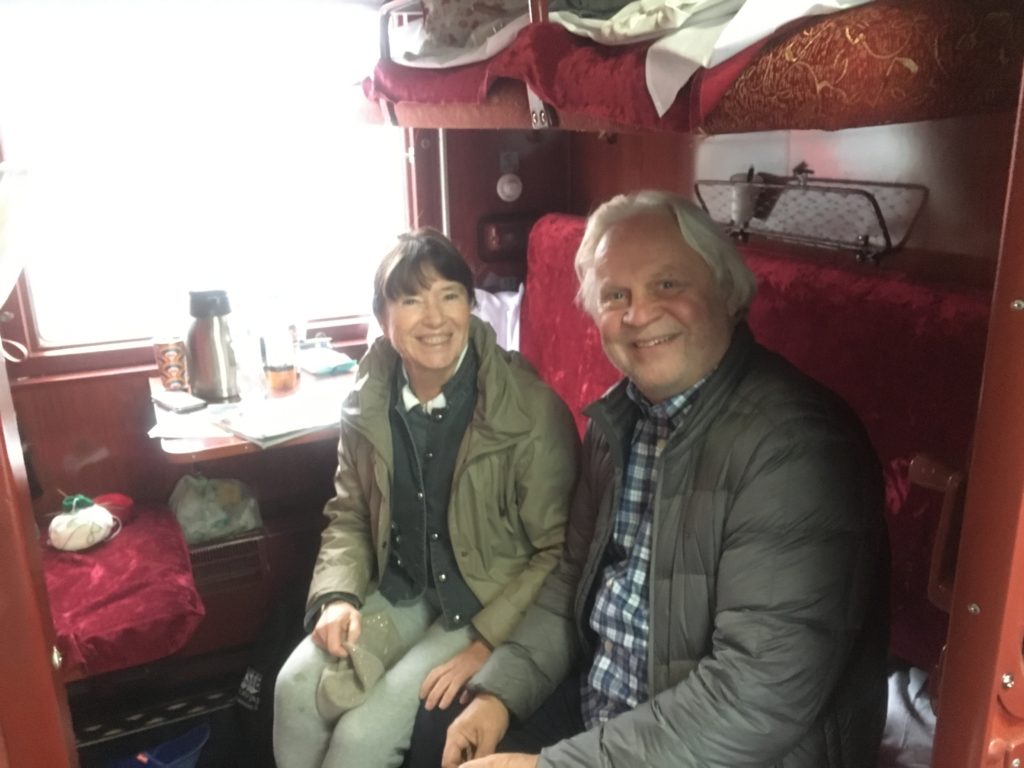
Maria was not enjoying her top bunk. It tilted outwards and she kept rolling against the protective bar. Sleepless, she lay in fear of being thrown out as the train jolted along. She couldn’t see anything like a seat belt! Sauli was afraid there was something broken underneath their carriage. He found the constant jerking and banging alarming. But I consoled them the carriage had probably survived fifty years so it was likely to survive a few more km! Disgruntled, he replied he thought rail lines were supposed to be straight. How could it be they zig zag?
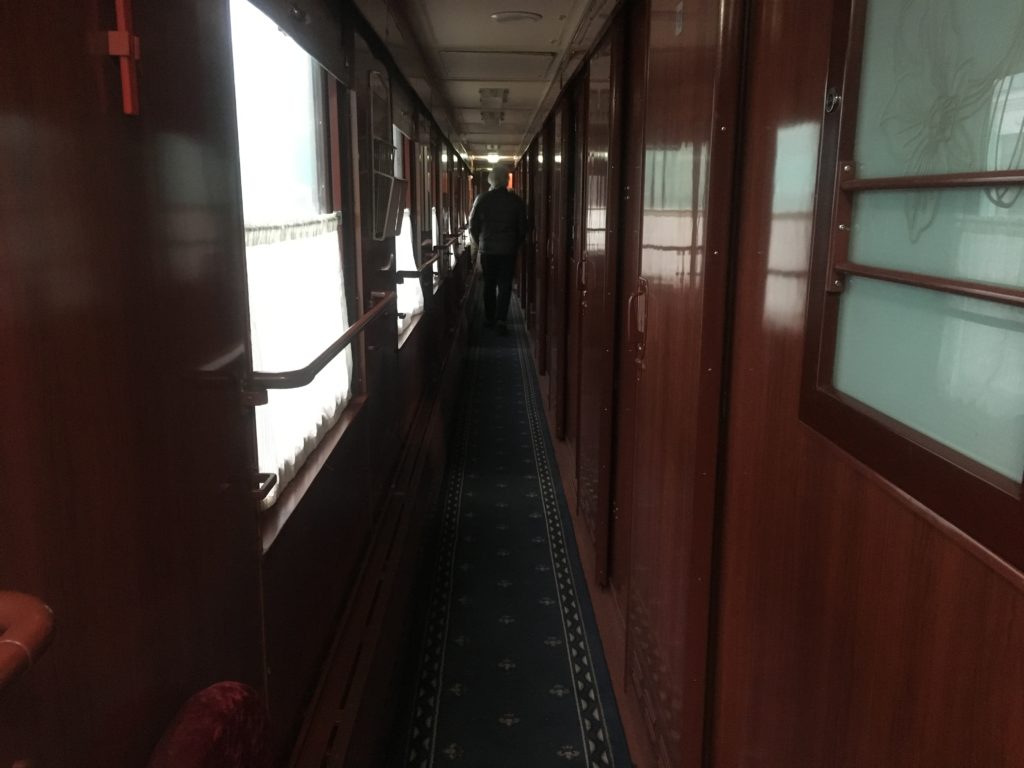
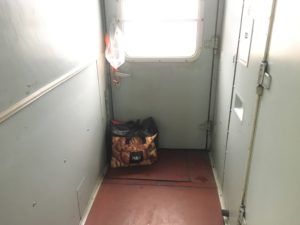
We engaged in a little Brexit analysis. They agreed with my theory that the EU itself was under attack, given the lies told about Brexit, listening to my teachers in Catalunya and the gilet jaune protests in France. Russia had weaponised social media years ago and would soon reap the benefits. They could just pick and choose the bits they wanted once the EU was smashed. Who else stood to benefit? If London was King, then the game was in check. We were not sure who was the Queen. Perhaps Germany? The Catalan politicians getting between 9- and 12-years imprisonment for their agitation would not help matters. I wondered how NZ could police their attempt to control social media? Would they become a mini-China? Blocking certain sites? United we stand. Divided … ?
We stared out the window.
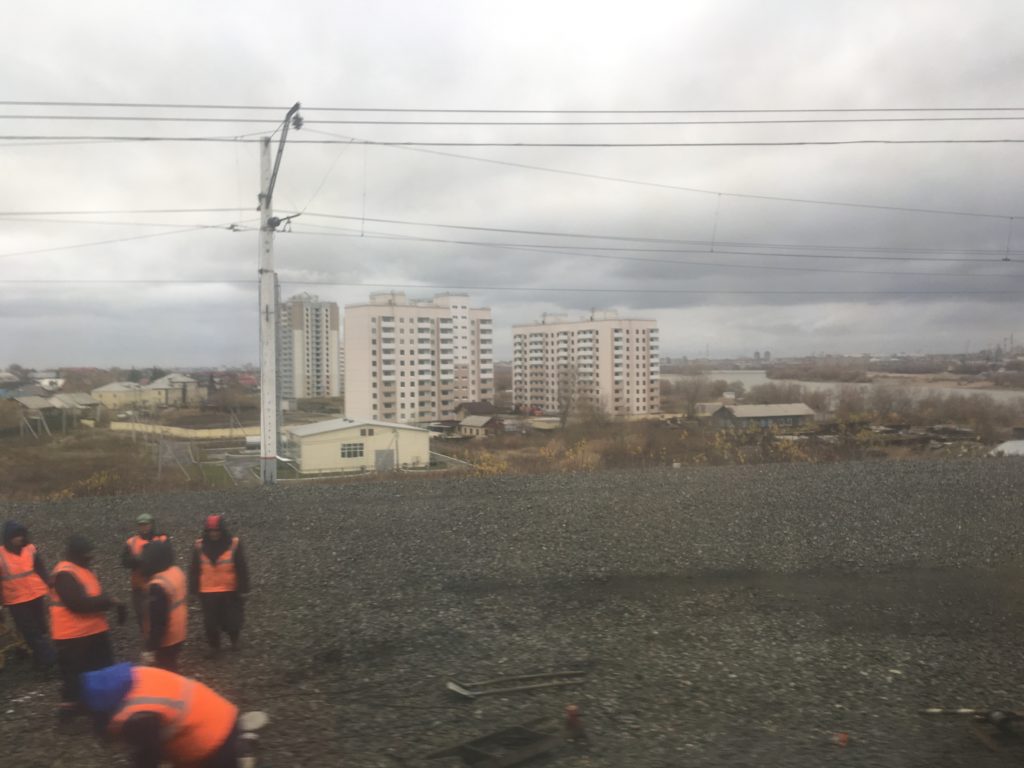
First-class also benefited from a little private washroom between two cabins.
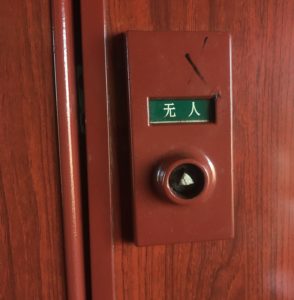
It consisted of a sink for private teeth washing and a shower hose that went over a drain in the floor. I believe they had warm water, too. No difference in their toilet rooms at the end of each carriage.
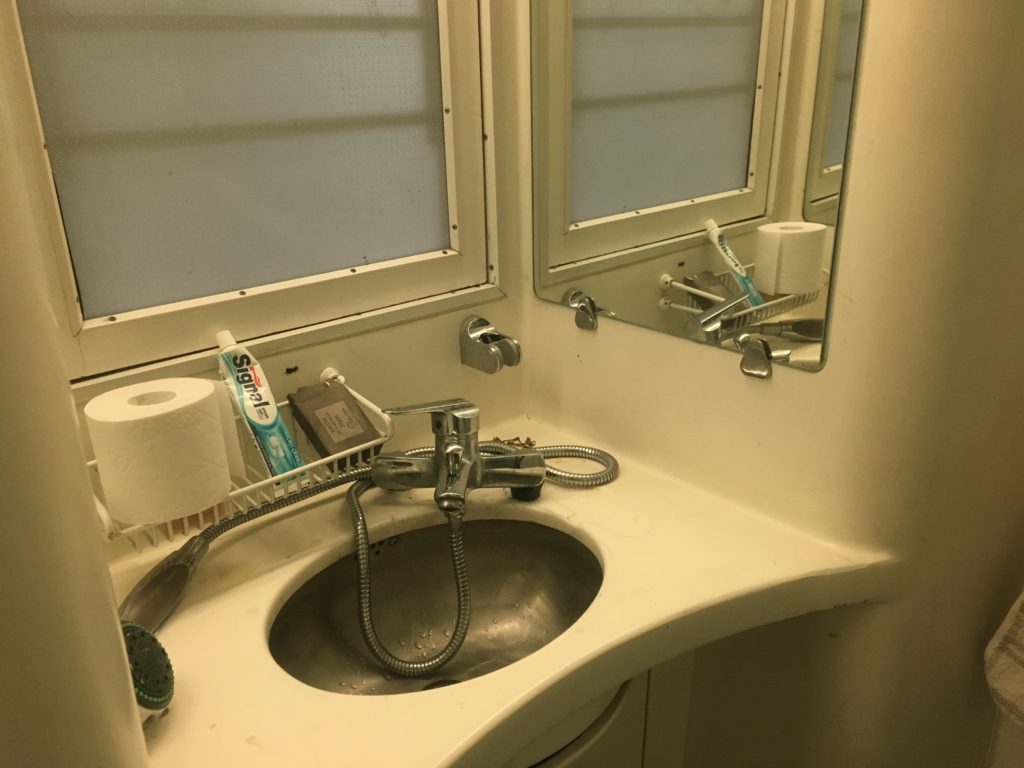
Each carriage captain had their own distinct manner when I greeted them with a cheery ‘Nī hāu’. They were normally stoking up the fires to boil the water – they had to keep that going – and to keep the temperature up for the Russian travellers! One captain was on duty at all times. For the longer stops where passengers might alight both captains put on their uniforms.
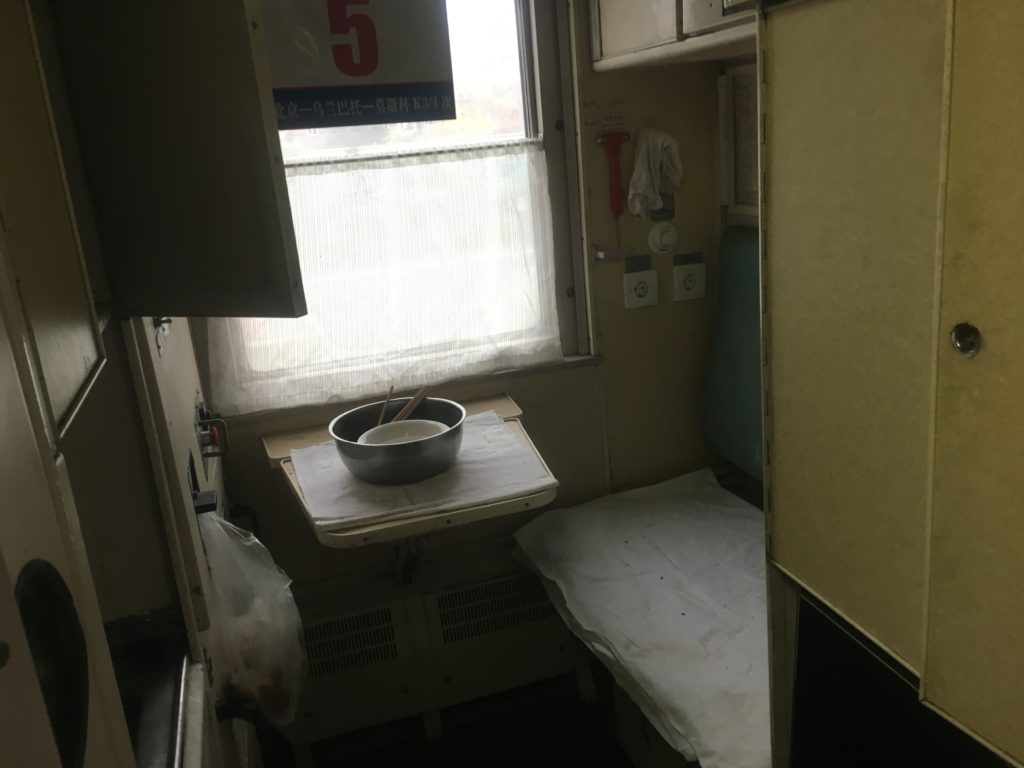
Otherwise one was normally lounging in singlet and trousers (our young captain liked to sing) watch a screen, or sleep. Our senior captain appeared to be a chef, he seemed to feed other captains on occasion too. The captains had a little office that doubled as kitchen. There was a small heating circle in the floor where they could perhaps cook a hotpot, as over a boiling spring in Rotorua.

Decided to try the restaurant car and, once I fished the swan sized bird poo of some sort of extruded cream from the middle of my borsht, had an enjoyable repast.
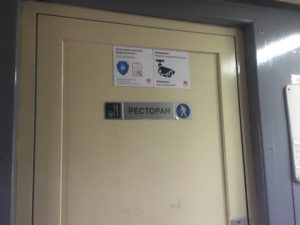
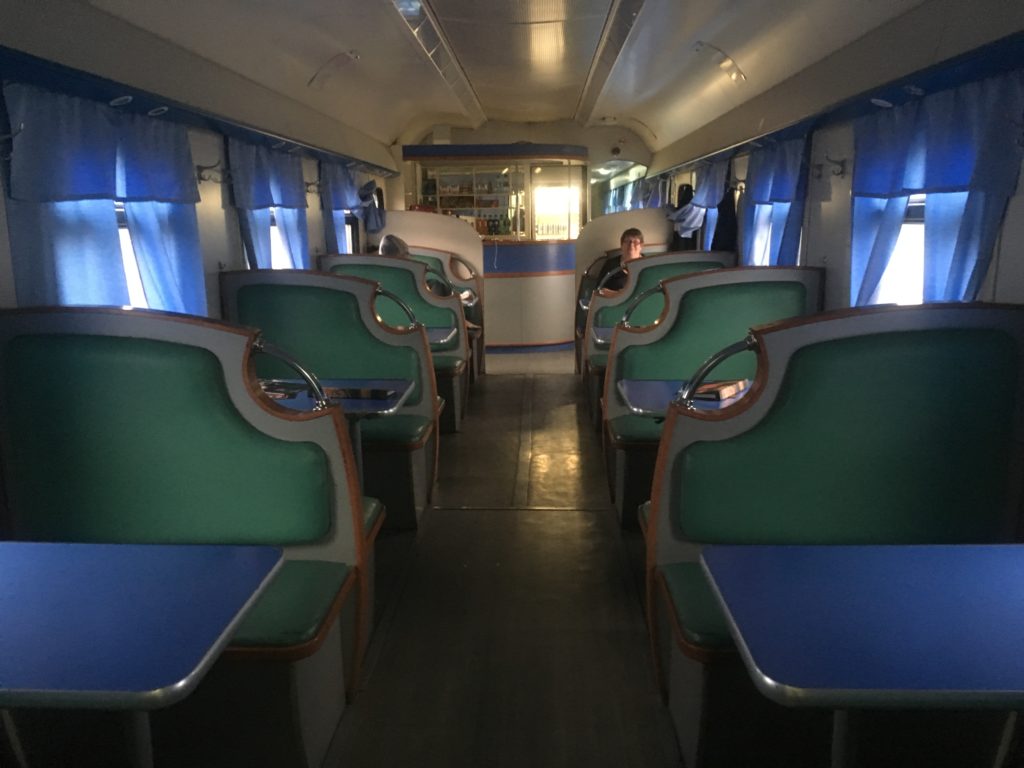
As I slurped my beetroot soup, I chatted with Father Will, a young French priest heading to Cambodia to be a missionary. For the rest of his life. He had travelled in Asia as a young man and at the age of 22 decided to train in a small seminary in Paris for eight years. He was a member of a society of about two hundred missionaries. He spoke English, Spanish, Italian and a little Vietnamese. Now 30 he would train for another two years in Cambodia before beginning his work in earnest. His society was not joined financially to Rome. Instead, like an old-fashioned monastery, they donated their entire capital to their society and lived off the income. His flights and accommodation were paid for by the brethren and had nothing to do with the Pope. He disliked what he saw as people’s common attitude that the Catholic church is one hierarchical beast like Macdonalds. Instead, he explained, it is a conglomerate.
To test my understanding, I reflected that the Church might be like a fly’s eye, examining society from a multitude of different facets. He accepted that and added the joke that when asked how many people worked in the Vatican, the Pope is reported to have said, ‘About half’.
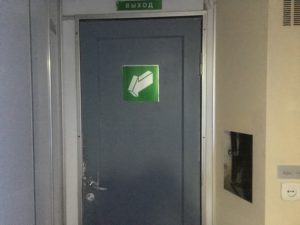
Father Will could not get a visa for China and planned to fly to Hong Kong before continuing to Cambodia. Although he went to the office in mufti and attempted to answer the official’s questions honestly, he did not want to commit apostacy and refute his religion. The sin of omission was okay, apparently. He thought China did not want priests observing the human suffering caused by their oppression regime. He would stop in Ulan Bator to visit one of his brethren who had been living there alone for some years. He had not brought him any Burgundy or brie.
Most of the scenery out of the window was flat, rural land. The Kiwis reported seeing a flurry of snow early in the morning. It had been zero degrees outside to welcome us to Siberia.
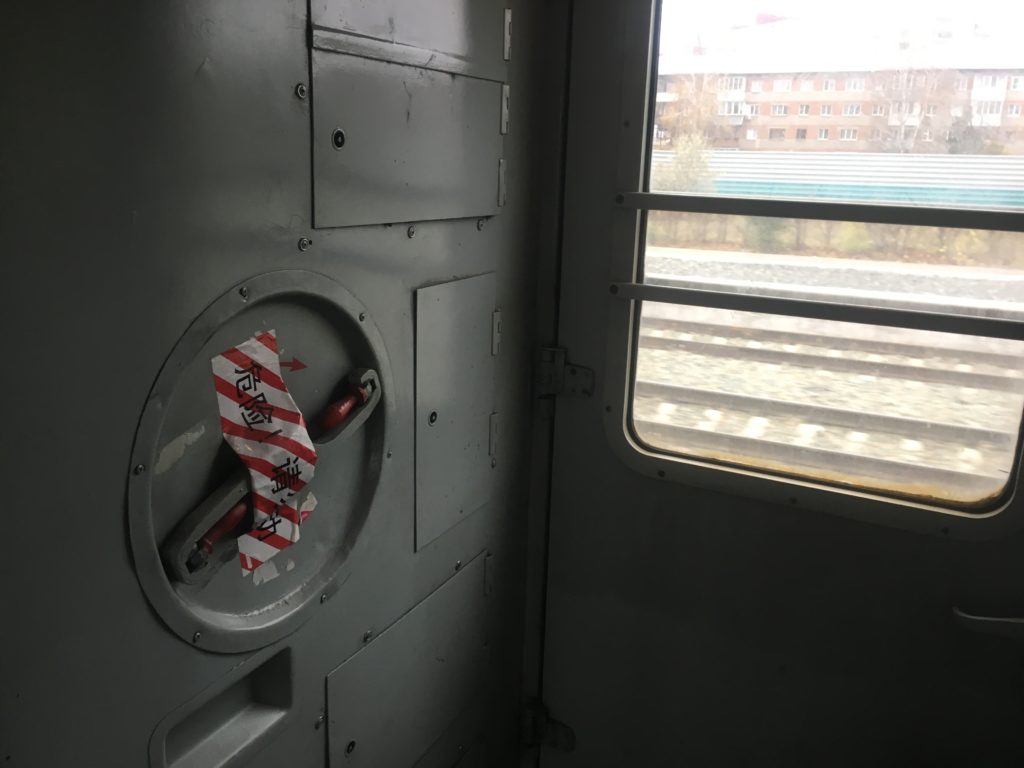
I met two youngsters from China, Ruben and Hong Lee, who were getting off at Irkuskt to see Lake Baikal. When I popped out to buy a bottle of water at a station (1.20 roubles for a big bottle) where we had 30 mins, it was definitely nippy. I hoped those young men had some decent winter woollies with them. Our nice young manager, standing on duty to guard his foreign charges, was freezing in his light uniform coat. As soon as he could he dashed back into our coal-fired heating.
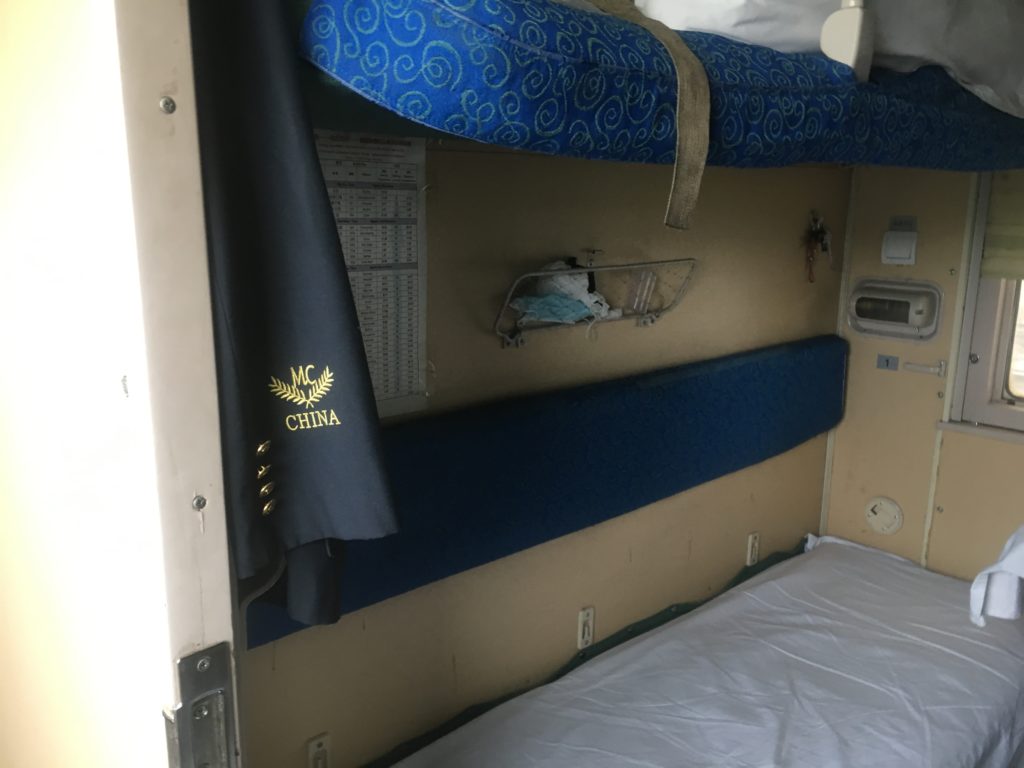
In renewed conversations on my perambulations Maria and Sauli suggested some people believed the EU began with Christianity trying to keep out Muslims. These were the sorts of rumours spreading through social media about the EU, possibly explaining my Irish woman’s belief that freedom of religion was an issue. I reported I never saw anything like that in the Brussels Parliamentarium EU museum. (Which I urge you to visit if you can.) My impression was the Union was a result of desperate craving for peace. There had been two world wars. There were orphans, ruins and soup kitchens. There were millions of refugees. The thinkers and powers that be agreed that it must not happen again. Peace had to happen and the best way was to find agreement through trade. Why else did countries go to war but to try and steal each other’s assets?
Having seen those memorials in Warsaw, Hamburg and Berlin only days before, having heard that all those cities had been severely, and deliberately laid waste, it was difficult to imagine religious bigots getting their way in the midst of all that suffering, all those refugees, all that disease.
Instead, we stared out the windows. So lovely to look at the soft marshy grass lands, that quickly change to forest or industry, almost in the passing of an oncoming train. The sky changed from pillow-grey to pinky fluff with hints of possible blue and then to heavy lead. Sometimes the sky was tiny, hemmed in with structures, buildings or trees, but mostly the sky was huge.
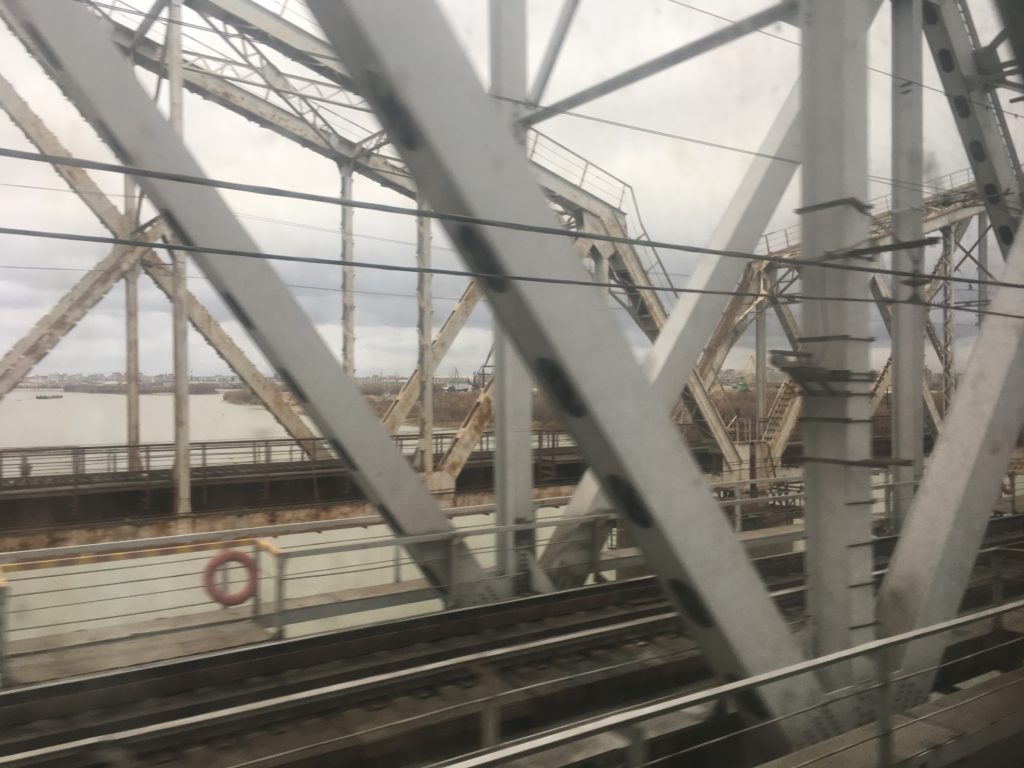
I was grateful Anton was my carriage companion. He seemed such a peaceful fellow, reconciled to his daughter living with his first wife in St Petersburg, and looking forward to seeing Ludmilla when she joined him in Mongolia. He had been with his second wife for over twenty years and spoke to her at least three times a day. He also spoke to his mother EVERY DAY. He told me he didn’t have to join the Russian army because of his eyesight. I was surprised because Irina had said on our walking tour that every man had to join between the ages of 18 and 27. Anton laughed. In his extended family of five boys, only one had joined. The others, being students or necessary workers, were exempt. Compulsory was an elastic concept in Russia.
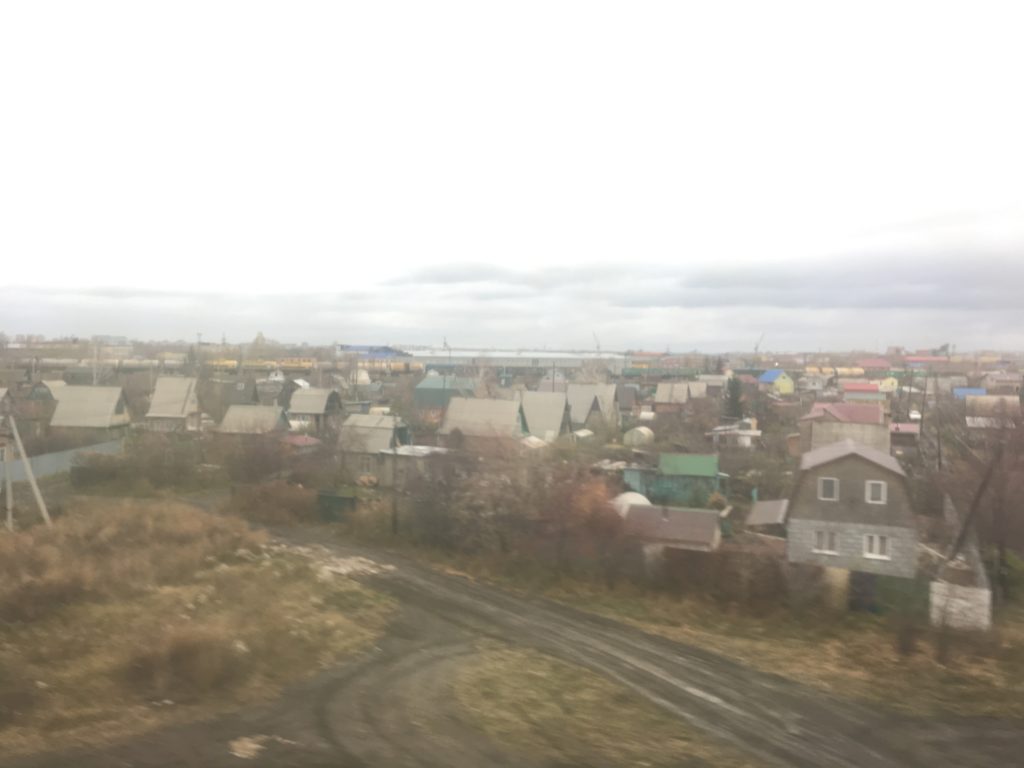
On the fourteenth day of my journey, I read that verse of the Tao. It seemed fitting, ‘Live in ancient; master existing present.’ Given the constant coal smoke and my little birdbaths in the metal sink, history was all around me and I was definitely trying to master the present!

There was something utterly relaxing about the knowledge I was not going anywhere except the train. The train took me along. I did not have to do anything except chat quietly with my fellow passengers, eat, excrete, wash and sleep.
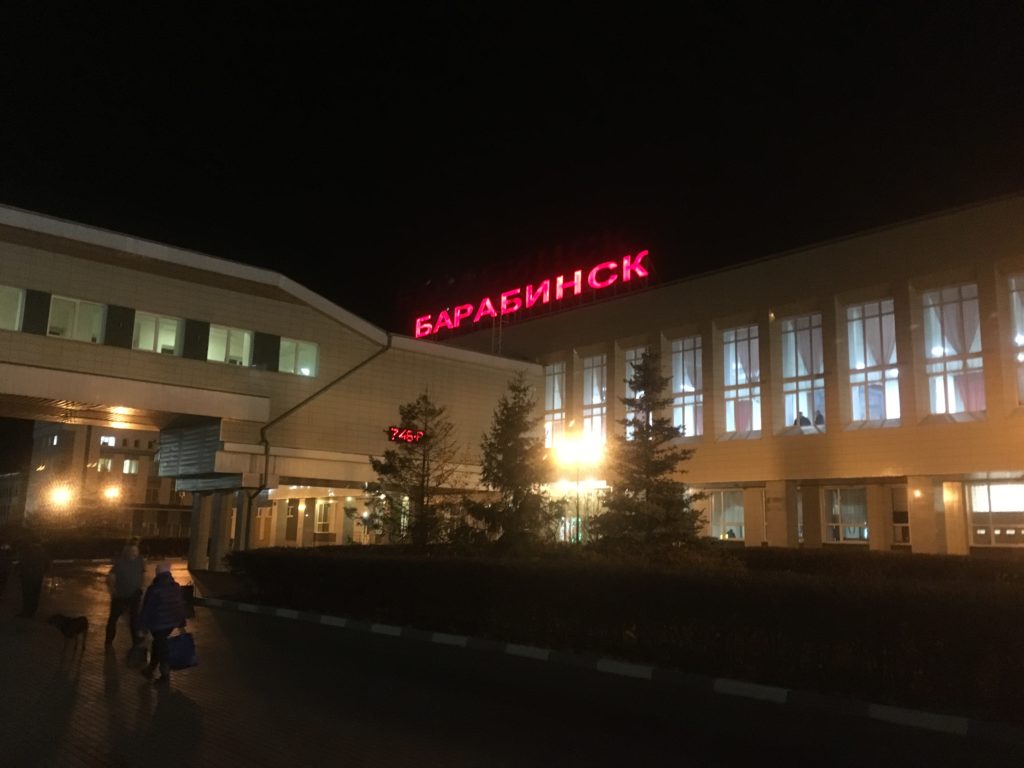
Nollaig, that sounds like a NIGHTMARE!
Thank you, Nollaig! Sounds like you did much the same trip? Yes, the Chinese waiting room and holding pen are at Erlian for FIVE HOURS! Were you in Chinese carriages or Russian? I think the days of bogie changes may be numbered as the Mongolians are building a wide gauge to match the Russian. (https://www.businessinsider.com.au/mongolia-extends-trans-border-railway-to-china-russia-2014-10) I agree, though, for the next trip I think it would be worth getting on and off the train for some tourist work, perhaps at Irkutsk, Ulan Bator and Ekaterinberg.
I was in the dreaded Chinese carraiges. The handle kept falling off the door from the inside, which meant I was locked in. One night I was bursting to go for a pee when the handle came off – had to keep banging for the guard to let me out !
Great read Vickoz. Wish I had done something similar on my trip. Travelled from the centre of England to Beijing on four trains (Leamington – London, Eurostar to Paris, Paris-Moscow, Moscow-Beijing). Strangest part was when we were all taken off the train for hours at the Mongolian-Chinese border (think it was Erlian). The beautiful classical music and all the false rose beds – some juxtaposition. I thought I was the only Irish person on the train until a guy from Belfast got on at Ulan Bator. Next time I would like to get off at Ekaterinberg and see the house where the Tsar and his family were executed in 1918.
the advertising you don’t know is encouraging people to donate blood for the people in need. The girl is the NO.1Female Pingpong Champion Ding Ning.
Brilliant, thanks, King. Glad it was a nice community service!
Xiexie
Remarkable! Epic! well done you’ve made it.
I read excitedly and i’m waiting for more!
I’ll translate it to Ella:-)
Best wishes from Moscow:-)
Spasibo, Tatiana! How wonderful you came along for the ride! Great to think of you in Moscow with your lucky students. I bet you are feeling cooler right now than I am here in humid Taiwan!
Wonderful write-up Victoria, I feel like I’ve experienced it with you! I think it’s a great way to use your time, experiencing the reality of the non-flight long distance travel options and ‘seeing the details’ – whether the loo goes straight to the tracks, how cabins are heated and managed etc – you’re doing great. Also really interesting to get a glimpse of how some of those landscapes that people don’t usually see are managed and the variety of lifestyles of your fellow travellers. Good luck with every connection, accomodation and language challenge – we’re there with you!
I do like you blog, Victoria. And your trip. It’s really fantastic! My English is not rich enough to express what I think about it. I feel like travelling myself!
Dear Begoña, I am very grateful you enjoy reading about my travels when you are such an experienced adventurer yourself! I’m very happy you feel inspired. I know you will have a great time where-ever you go – with your language skills and interest in other people – the world is yours!
I have finally got through it.. wow, that was epic
Page 6 best for me, i needed a sign of the step by step baby steps stepping stones
You rock our intrepid reporter
See you real soon in brissie
Thank you, Louiselle! Glad you managed to get through it. (Hope you were able to have a shower along the way.) Looking forward to landing in Port Brissie!
OMG! Feels like I wrote that first comment days ago…. (it was after page 1 not realising there were 6 days of blog…YOU MADE IT!!!!
Bloody hell, I was right there with you. Good job girl…show it how it’s done.
Thank you, MA! I am so grateful you managed to get through it all. I am trying to walk the talk but hadn’t realised how much fun it was going to be. Now I’m in hot, humid Taiwan it’s quite peculiar thinking I was looking at snow just a couple of weeks ago!
I knew Anton would be good company….all Anton’s are! 😉
I send best wishes and good luck to all Antons, from Mongolia to Melbourne, may they be happy, healthy and looking forward to eating apples from their own trees.
That was EPIC!!!! Now for the sea voyage. Can’t wait to read about that. Bon voyage, V! Xoxo
Thank you, Lucy, it’s fantastic knowing you’re there with me! Ahoy, Sailors!